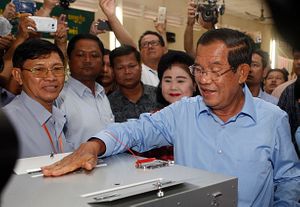As Western nations gauge their responses to Cambodian Prime Minister Hun Sen’s resounding electoral victory, and as media coverage continues its perennial focus on corruption in the country, it seems pertinent to ask: who is really to blame for such an outlandish result? One seemingly counterintuitive answer is the United Nations.
In Cambodia, the UN instilled a belief in elections as the ultimate form of political legitimacy. It was not a democratic ethos practiced across civil society that mattered; rather, it was having so-called “proper” liberal democratic procedures and laws that would allow Cambodia to be welcomed into the international community.
Democracy understood simply as multi-party elections dates to the UN’s intervention in Cambodia in the 1990s. As the Cold War came to an end, Vietnam pulled its decade-long support for Cambodia in 1989, two years before its patron, the Soviet Union, collapsed. This left many Western diplomats wondering what to do with regard to Cambodia. The answer came in the form of the Paris Peace Accords, signed in 1991.
The United Nations Transitional Authority of Cambodia (UNTAC), the international mission tasked with implementing the Accords, was the most ambitious peacekeeping operation that the UN had ever undertaken. Critical scholars and sympathetic diplomats called its two-year takeover of the domestic affairs of a sovereign nation-state (to create a “comprehensive political settlement of the Cambodia conflict,” “restore and maintain peace,” and “promote national reconciliation”) revolutionary and unprecedented. Elections would finalize the UNTAC mission and provide legitimacy to the Cambodian government.
In order for Hun Sen’s party to participate, he disavowed communist ideologies and introduced private property, championed the multi-party electoral system over single-party rule, and even changed the name of his political party from the Kampuchean People’s Revolutionary Party to the Cambodian People’s Party (CPP). In May 1993, Hun Sen’s CPP secured 51 seats (with 38 percent of the vote), coming in second to the Royalist-aligned party, FUNCINPEC, which won 58 seats (with 45 percent of the vote). Neither party could form a government.
Despite the hung parliament, the election process was championed by Boutros Boutros-Ghali, then-UN Secretary General, signaling the successful conclusion of UNTAC: “The spectacularly high voter turnout is eloquent testimony to the confidence that UNTAC has inspired among the people of Cambodia, as well as to their deep yearning for participatory democracy.” The inference of this statement was that multi-party elections, regardless of the results, should be celebrated.
Hun Sen refused to cede the election, however. He rejected the results for what he called “massive irregularities” – broken plastic seals on ballot boxes, delible ink on fingers, ballot tampering, and double voting. Rather than accept defeat, he threatened to side with a growing secessionist movement to force himself into a coalition government. Better to keep the country unified than risk it splitting apart, reasoned UNTAC, so a coalition government between Hun Sen and FUNCINPEC’s Norodom Ranariddh was formed.
This unusual end to the UN’s first foray into international interventionism had lasting effects. UNTAC split the country into two ruling parties, forcing Hun Sen to figure out ways to consolidate power without upsetting his new Western patrons. UNTAC taught Hun Sen that multi-party elections are necessary in order to be recognized by the international community. He saw elections as an end, and not a means, of the democratic process. To this day, much fanfare goes into electoral preparations, from ballot positioning of political parties to practice voting in villages. When challenged by Western media that the main opposition party was barred from this year’s election, Hun Sen was quick to reply that there were in fact 20 parties competing, implying that this statistic alone was proof of multi-party democracy. Even before the last vote was counted on Sunday, the CPP quickly aired a video proclaiming that the country “can hold a good election.”
Elections are different from political rule, of course. Power has historically been concentrated in Cambodia. In the 1950s and 1960s, when elections were first held, the party controlled by former king Norodom Sihanouk won every seat in government in all four elections. Prior to Sunday, Hun Sen had never reached that same level of power. Actually, he came close to losing power in 2013, when two opposition parties merged to win 55 to CPPs 68 National Assembly seats; however, Hun Sen’s ruthless response (imprisoning opposition leaders, shuttering media outlets and creating a sense of fear among everyday citizens) consolidated his control. After Sunday’s election, he has finally reached the electoral status of Sihanouk, making him look as powerful as Cambodia’s celebrated God-Kings. Hun Sen’s electoral victory in 2018 is, therefore, more a return to the historical norm of centralized power in Cambodia than a sign of democracy’s end. Democracy has always been defined in Cambodia as nothing more than multi-party elections, just as the United Nations originally intended.
Will Brehm, an assistant professor at the Waseda Institute for Advanced Study, Waseda University (Tokyo, Japan), has researched education and society in Cambodia for over 10 years. Follow him on Twitter @wbrehm.

































